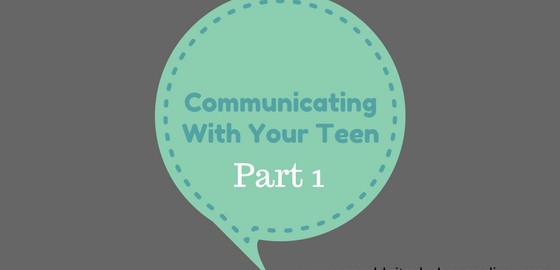As their children start to move into adolescence, parents often report that their child appears to have changed overnight and the way that they used to approach communicating with their child no longer seems to work. As a therapist who works with children of all ages, I also find that I need to approach my communication with a child differently once they enter their pre-teen and teen years. Because communicating with your teen can be a challenge, this series of posts will focus on communication strategies to help you communicate more effectively with your child.
Pre-Work for Parents:
Part of communicating with your teen in an effective way includes understanding how their brain works. I encourage you to learn as much as you can about the changes that are going on in your child’s brain, so you have a better understanding of the biological factors contributing to the changes occurring for your child. I strongly recommend Dr. Dan Seigel’s book Brainstorm for this purpose.
Beginning at about age 11-12, your child starts to experience changes in their pre-frontal cortex which is the area of the brain responsibility for activities such as; planning ahead, making decisions, weighing the risks and benefits of a decision. While we may automatically consider how this makes an adolescent more likely to participate in risky behaviors, Dr. Seigel proposes that these changes also create opportunities for enhanced learning during adolescence.
Communication Strategies for Communicating With Your Teen
- Be Authentic-Your children can recognize when you are being “fake” and that may contribute to them shutting down or disengaging.
- Be ready and take advantage of times the adolescent seems willing to talk. Some parents of teens have found car rides or shopping lines to be great places for conversation because it feels less intense for the teen.
- Focus on what you can control. Hint: You cannot control your child’s thoughts or feelings. You can control your behavior and expectations of your child.
- Monitor your own emotions. Do not take your interactions with your teen personally. Avoid making decisions when you or your teens are upset. Monitor your feelings of fear, anxiety and anger so that they don’t impair your communication
- Ask questions from a place of curiosity & show respect for your child’s opinion. Incorporate your child’s ideas when possible. Show empathy for your child.
- Help the adolescent think critically. Avoid Lecturing. Keep it short and simple.
- Pick your battles/respond selectively.
- Look for the good.
Ready, Set, Go Communicate! Check out Part Two of this series, coming soon, for an opportunity to strategize about how you may want to communicate with your child differently.
Sarah
I recognize that these tips are easy for me to describe in a blog post and may be difficult to implement at home. If you need extra support in improving your communication with your teen, do not hesitate to reach out to a family therapist in your area. Those in the Eagan, Minnesota area may wish to visit my Counseling Page for more information about the services I offer.

I used to pick my battles – it’s all behind me now!
Such great advice. I think I was aware of most of these when my son was a teenager. Unfortunately, I wasn’t in a place personally to utilize these suggestions effectively. I think that is a huge key in parenting. However, even though my son is now 19/20, I am able to see how effective these tools are while communicating and listening to him.